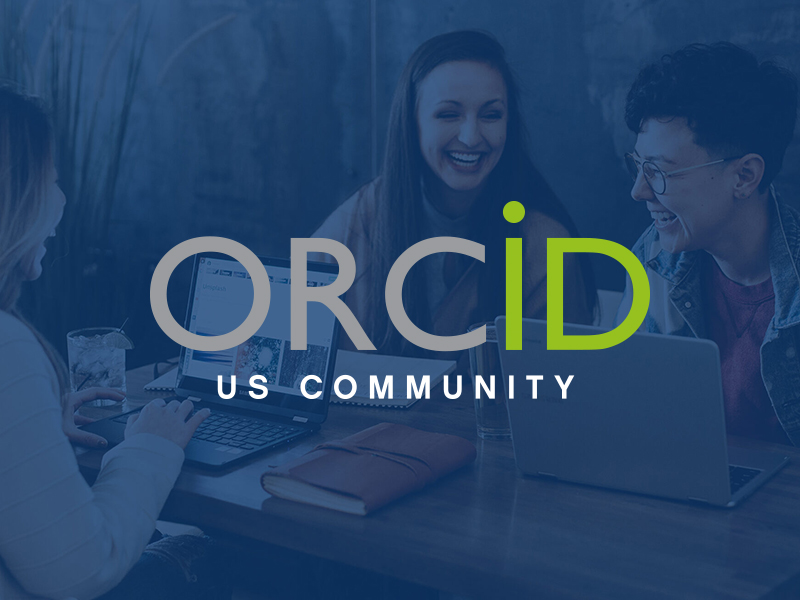
ORCID US Community member North Carolina State University (NC State) has implemented an ORCID integration with the NC State University Libraries’ Citation Index, a custom system for recording publications by NC State faculty. While the Libraries have been harvesting faculty citations for over 10 years by manually searching in Web of Science and using a local API to push citations to faculty profile pages, the ORCID Member API is now helping to streamline the process to better serve NC State researchers by providing more complete and reusable data, and more user control. Jason Ronallo, Department Head of Digital Library Initiatives at NC State Libraries, provided an overview of their ORCID work at the 3rd ORCID US Community Showcase webinar, summarized below.
Academic libraries like NC State are in a unique position to both help and receive feedback from university faculty, as liaison librarians and other faculty services staff interact with faculty on a regular basis. In an effort to help faculty gain recognition and get credit for their work, ORCID was identified as an interoperable way to distinguish individuals and keep publication lists on faculty profile pages current to attract graduate students, raise awareness of their activities within their departments, and generally improve the discoverability of their work. The Libraries’ existing Citation Index application was identified as a strategic point for ORCID integration. With a small team including technical, outreach, and data maintenance representation, they developed their service approach and the technology to support it. Developed by Luke Aeschleman, the Citation Index ORCID API integration took a couple of weeks for initial development and another couple of weeks for testing and minor changes. The Citation Index ORCID integration allows faculty to authenticate their ORCID iD and connect it with their NC State “Unity ID,” thus designating NC State University as a “trusted organization” on their ORCID record to both read data from and write data to their ORCID records.
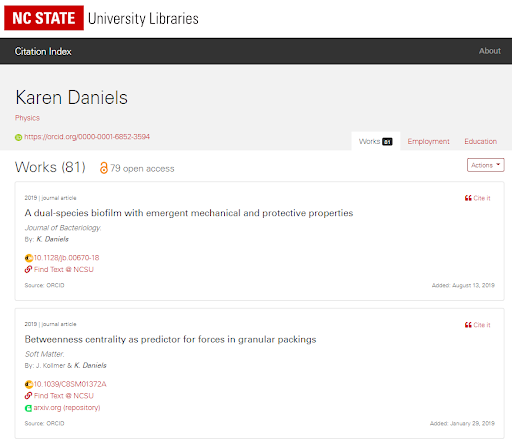
To spread the word to faculty about the new ORCID integration, the libraries began by focusing on targeted outreach for existing library services and adding ORCID into the mix. As with any new tool, one needs to know its purpose before one can learn how to use it. Starting with groups that were already using the existing publication block on their faculty profiles, the libraries were able to scope the work and iteratively hone the messages and services for each department. Liaison librarians helped identify initial pilot groups to reach out to first, including the Wilson College of Textiles and the Crop and Soil Science department in the College of Agriculture and Life Sciences. Liaison librarians were instrumental in scheduling time for the libraries to present and provide direct outreach at department faculty meetings, and the existing relationships and knowledge that liaisons brought to the project helped spread the ORCID message to receptive groups. After the first few meetings, faculty in attendance started to talk to others about the library’s publication updating service via ORCID, and they are now getting invited to faculty department meetings by word of mouth and faculty advocating to each other, a beneficial side effect of cross-departmental interdisciplinary work on campus.
In planning for faculty department meetings, the ORCID team created a presentation agenda template that could be customized to provide an engaging, targeted pitch for each department, showing examples of how ORCID could benefit faculty depending on where they publish, the journal ORCID requirements for that discipline, and where they typically go to apply for research funding, if those funders are asking for ORCID iDs in submission and reporting workflows. ORCID is presented to faculty from the angle of discoverability, with the ORCID iD being a route to find out more about the researcher and their past works and affiliations.
One of the primary messages for asking researchers to connect their ORCID iD with the NC State Citation Index, is to “unlock additional services” that the Libraries can then provide by reading data from and writing data to researchers’ ORCID records on their behalf, enabling local auto-updates for publications on their faculty profile as well as updates to their ORCID record. A promotional flier was created to document the benefits of having an ORCID iD, the process for registering and connecting your ORCID iD with the Citation Index, and the additional benefits provided by connecting your ORCID iD.
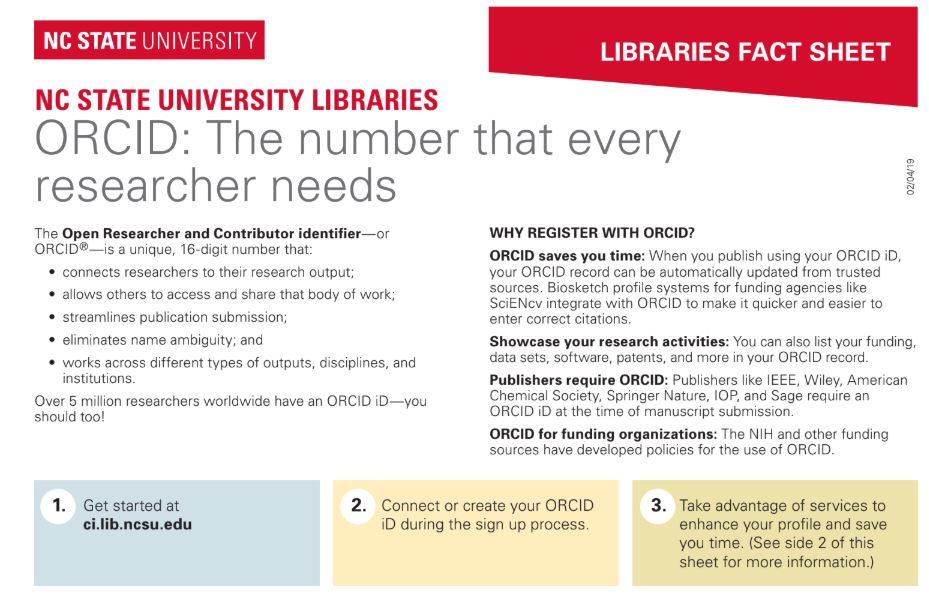
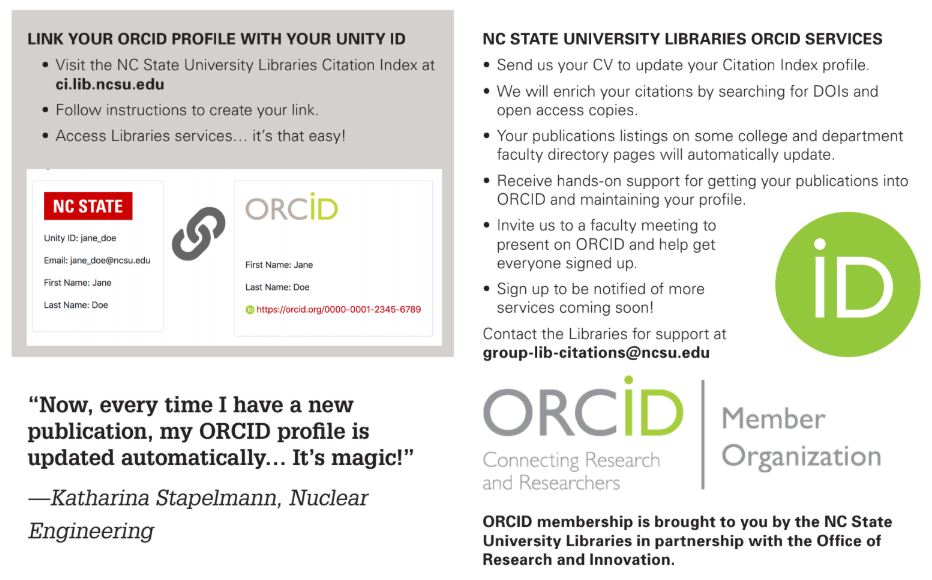
The user-facing workflow for connecting an ORCID iD with the Citation Index follows the typical ORCID OAuth pattern. Users start by clicking a button prompting them to “Get Started” linking their Unity ID with their ORCID iD, along with messaging about what ORCID is and why researchers should care:
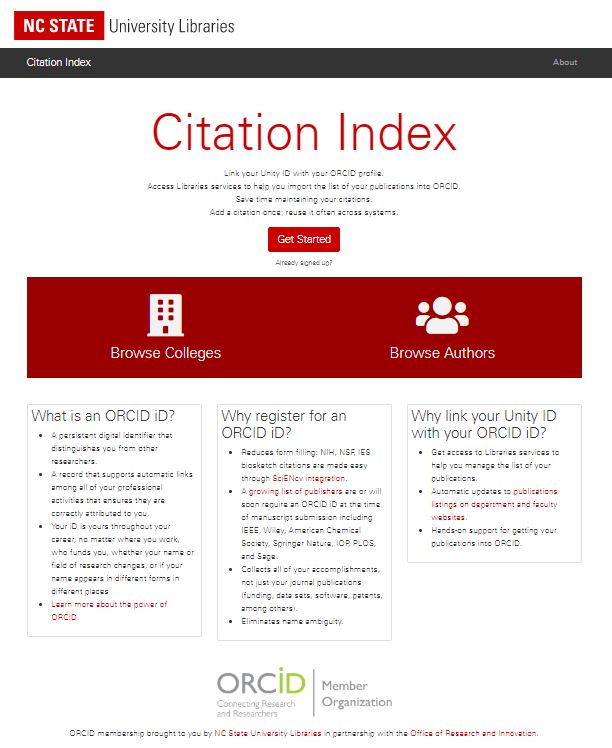
Upon clicking the “Get Started” button, users first log in with their NC State credentials via Shibboleth, and then are prompted to either sign in to their ORCID account, or register for an ORCID iD if they don’t already have one.
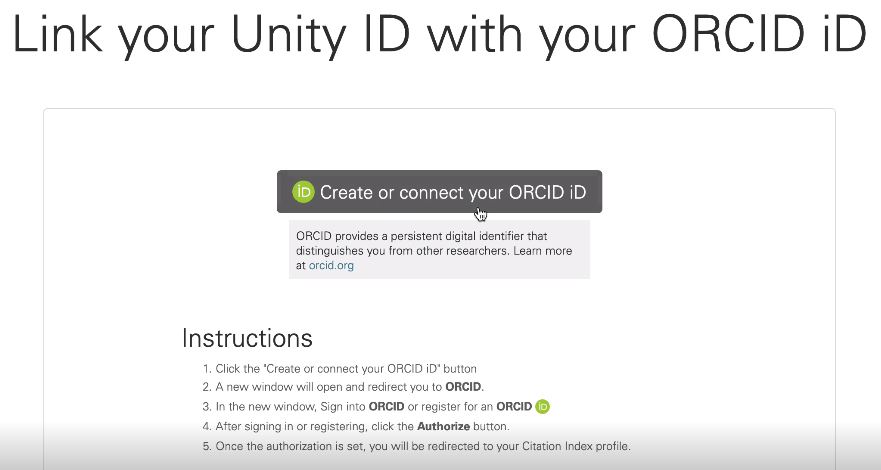
An authorization screen then appears, asking the user for permission to authorize NC State University Libraries to both read limited-access data from their ORCID record and add/update research information and biographical data on their ORCID record:
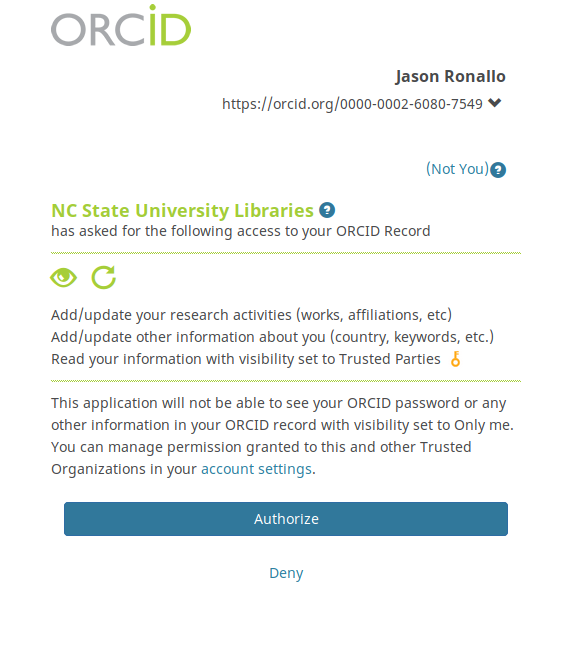
Once the user clicks “Authorize” and the connection is made, NC State University Libraries appears as a “trusted organization” in the “Account Settings” tab of the individual’s ORCID record:
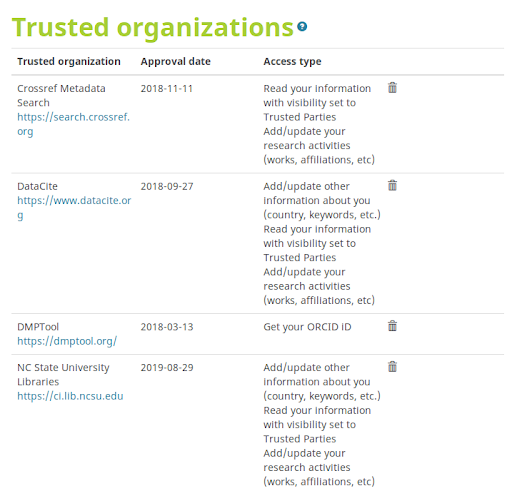
If a user goes to log in to their Citation Index profile rather than coming through the main portal, a red button will appear prompting them to “Create or Connect your ORCID iD” with their profile if they have not already done so:
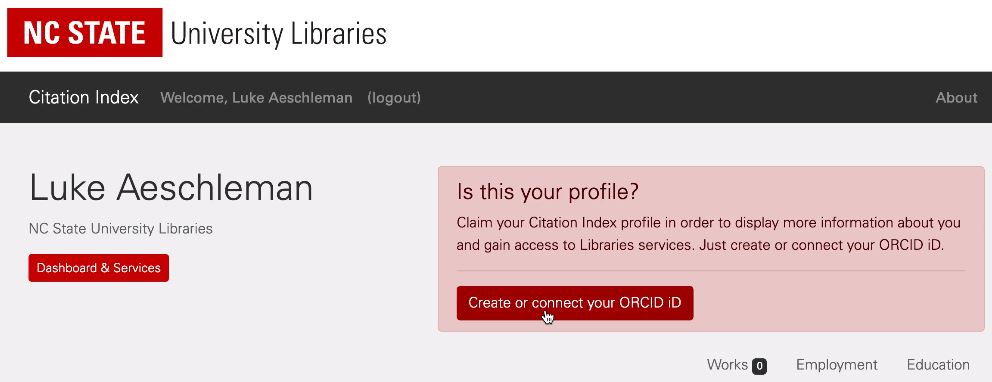
NC State University Libraries then harvest works, employment, and education data from the ORCID record, if available, for display on individual profile pages, which also serve to promote open access and the Citation Index API. Once they connect their ORCID iD, users get access to an individualized dashboard, where different users can access different services, such as various levels of “CV service,” to help faculty get the most use from their ORCID record over time and encourage faculty to continue taking advantage of library services. The Libraries can see who recently signed up and how many from each department have signed up, while users can see the progress they have made on their individual dashboard. The platform will soon show a count of how many citations the libraries have added to their ORCID record for them.
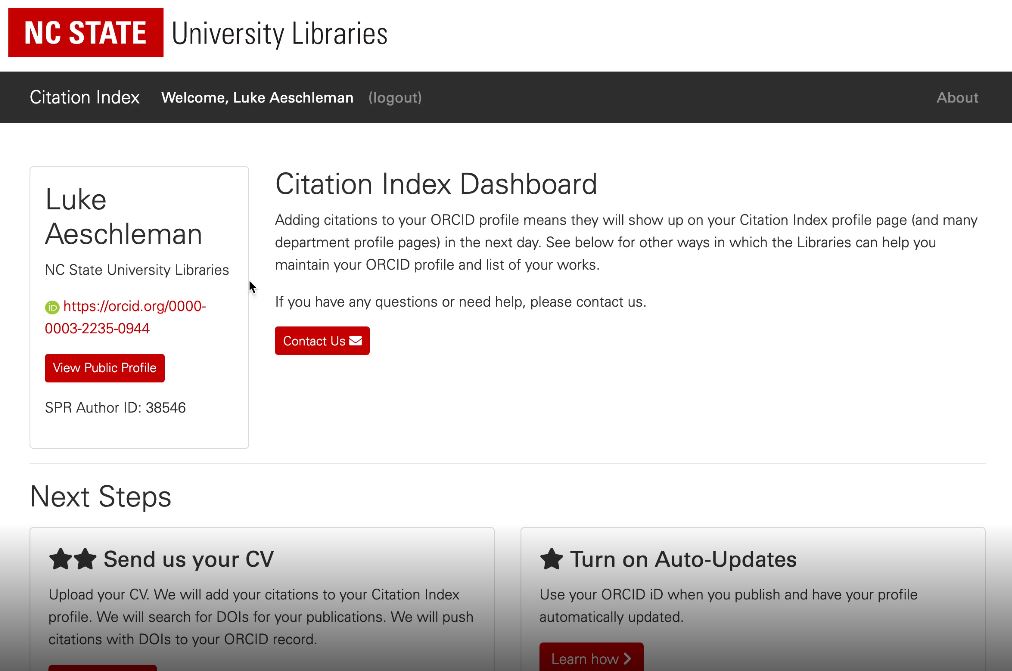

For faculty hesitant or too busy to fully populate their ORCID record with data, the Libraries created a “CV service” to help streamline the initial process of inputting data into ORCID. To use this service, faculty must connect their ORCID iD in the Citation Index, and provide a copy of their most recent CV or any other list of publications. Library staff and student workers then add citations locally to the Citation Index and then sync citations with DOIs to ORCID via the ORCID API.
As a result of this collaborative ORCID integration project, all involved have gained significant insight on the ecosystem around open data and open citation data. Interoperable tools like ORCID have been key in bringing together data from multiple sources and moving from a model of authority control to allowing researchers more control over their own name and associated data. Citation data is generally messy and confusing, and every data source has its flaws. In the long run, an initial investment in ORCID integration and promoting ORCID iD to researchers will help to streamline citation data and make it easier to keep track of contributions and affiliations. Faculty who have used the service so far are appreciative, word is spreading, and the Libraries ORCID team is getting invited to more department meetings.
The Libraries are currently working with other campus stakeholders to explore how ORCID data can be reused. For example, they are working on an API to allow the citation data to prepopulate faculty reporting in Digital Measures (where they are utilizing the Digital Measures ORCID functionality) in collaboration with the Office of Institutional Research and Planning. There is also significant growing interest in terms of funder requirements for ORCID (such as new requirements announced by NIH) and with the recommendation to use SciENcv for biosketches, which has an ORCID integration. The Libraries are now looking at how to integrate ORCID into trainings on SciENcv along with their CV service to help faculty get “funder ready.”
The NC State Office of Research and Innovation has been partnering with the Libraries to support ORCID membership, which has helped the Libraries gain entry to other high-stakes discussions around research infrastructure on campus, and ways the Libraries can provide support. ORCID continues to come into play in strategic thinking on how to support complex challenges in the research and innovation ecosystem. Thinking ahead, NC State University Libraries hopes to continue building relationships with other campus stakeholder units and continue with more collaborations in the future. Ultimately, they hope to reach every department with their new Citation Index and expand outreach to graduate students.
To learn more about NC State’s ORCID activities, consider reviewing the webinar and presentation slides from which this blog is based. Many thanks to Jason Ronallo at NC State for collaborating, as well as the following team members at NC State:
Core ORCID team:
- Beth Ashmore, Associate Head, Acquisitions & Discovery
- Danica Lewis, Collections & Research Librarian for Life Sciences
- Jason Ronallo, Dept. Head, Digital Library Initiatives
- Kevin Beswick, Lead Librarian for Software Development, Digital Library Initiatives
- Liz Bell, University Library Technician
- Luke Aeschleman, Digital Technologies Development Librarian
- Shelby Hallman, Research Librarian for Engineering and Entrepreneurship
- Alex Carroll, Debbie Currie and Sonoe Nakasone (past members)
Support network: liaison librarians, advisors from research engagement and collections and research strategy plus more public services staff, administrators, etc.
For questions, please contact orcidus@lyrasis.org.

